In this episode, we bring you insights from a key discussion on the future of computing and manufacturing in Taiwan, featuring Jensen Huang, CEO of NVIDIA, and Young Liu, Chairman of Foxconn.... The conversation explores the vital role of "Team Taiwan," which Huang describes as the "epicenter of the world's computing industry" and home to NVIDIA's "most important partners".... You'll hear about Foxconn's transformative "Genesis" initiative, leveraging AI for smart manufacturing, next-generation robotics, and digital twins. A major focus is the deep collaboration between NVIDIA and Foxconn across smart factories, EVs, and smart cities..., including their plan to build a joint "AI factory" in Taiwan to serve their needs and the broader ecosystem.... Jensen Huang also shares his perspective on AI as a new "multi-trillion dollar industry" fueled by "AI factories" and offers advice to Taiwanese companies to "keep up with the AI" and "transform themselves", emphasizing the need to "Just get to it".... Join us for a look at the cutting edge of technology and the strategic importance of Taiwan in the AI era.
And, here’s a bonus for being a loyal subscriber to TechSoda: Transcription of the Stand-Up Press Conference Outside Huang’s Hotel in the morning of May 21:
Jensen Huang
I saw Quanta and Foxconn and Pegatron and Asus and MSI and Pegatron and so many, so many. They were so good. And they have really great new products.
Of course all of our Grace Blackwell systems are in full production and people are excited about that. You know, as you know, the Grace Blackwell systems are full rack. It's like a data center product. You know, it's like a data center in a product and very different than previous computers and we have the new RTX Pro server that runs everything from graphics to AI and there were Jetson products for robotics, lots of robotics products and we're very happy to see that. Robots are going to be the next industrial revolution and Taiwan has to be at the center of that and so I'm very happy to see a lot of energy around that.
Reporter:
Taiwan makes over 70% of the world's share. Have you discussed the semiconductor tariff with the White House? What's your opinion?
Jensen Huang:
I don't have an opinion on that. I think there's a resetting of the trade around the world, and whenever it settles down, the industry will readjust. I have every confidence things will work out.
Reporter:
Some people describe you as the only CEO who can maintain the market of Taiwan, China, and the United States all at the same time. How did you successfully do that?
Jensen Huang:
I'm not doing anything specific. The most important thing is I want our partners to succeed. I want our industry to grow. The technology that we build can unite people.
This is very important technology, and I want to make sure that people have access to it, they understand it, and that we can be helpful to them. We can all succeed together.
Reporter:
Jensen, in your keynote, you described Agile AI as a form of digital robot. How do you see its development evolving and what is your perspective on embodied AI and its applications in the physical world, particularly in robotics?
Jensen Huang
Well inside, the way that your information systems in the past was created was software and business process, a lot of software written by humans.
Now we have agentic systems, agents, AI agents, and they're smart software and they can understand the goals, they can read documents, they can work with each other and they can work with us to solve problems better for us. And agent AI is essentially the software version of a robot. A robot simply means that you can sense, you can perceive the world, you can reason, come up with a plan, and take action.
That's essentially what an agent does, but a robot does it in the physical world, which means the robot has to understand more intelligence, physical world intelligence, that the software doesn't, but otherwise it's the same thing. Really, that's why it's so exciting. One technology could be used inside the computer and outside the computer.
Reporter:
Jensen, why do you want to build a supercomputer in Taiwan? Is that for industry development?
Jensen Huang
Yes. AI is a technology that is, of course, everybody understands, quite incredible and can solve many problems for us. But that's just the technology layer.
AI is also an industry because you apply energy and you can produce AI that is quite valuable. And Taiwan should have AI industry here to serve all of its local industries, healthcare companies, industrial companies, manufacturing companies, of course, semiconductor companies, education, and society. And so Taiwan needs to have AI infrastructure here. And it's really important that Taiwan also takes advantage of this opportunity to jump into AI research. This is a new beginning. And I have every confidence Taiwan will do very well.
Reporter:
You announced new supply chain to build a supercomputer. Can we have another new opportunity at this conference?
Jensen Huang:
Well, we're building an AI supercomputer here. And Foxconn's partnering with us. TSMC is a partner. And of course, the Taiwanese government is also supporting us.
And so that's really terrific. And on top of that is an ecosystem that we have to build.
The ecosystem we have to build in Taiwan includes teaching how AI works, so up-skilling. We have to support researchers and scientists, so there's a lot of new AI research to do.
And we have to help the industries understand how to use the AI. And so the first job is to build the AI factory. The second job is to teach people how to use it. So we have lots of work to do.

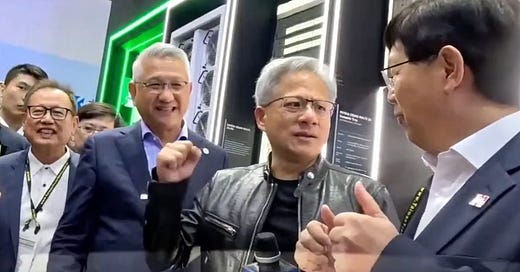



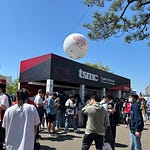

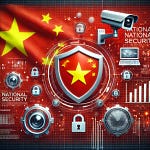

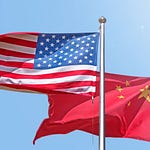

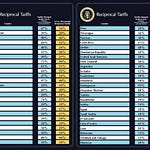
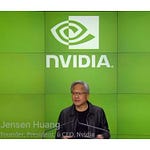
Share this post